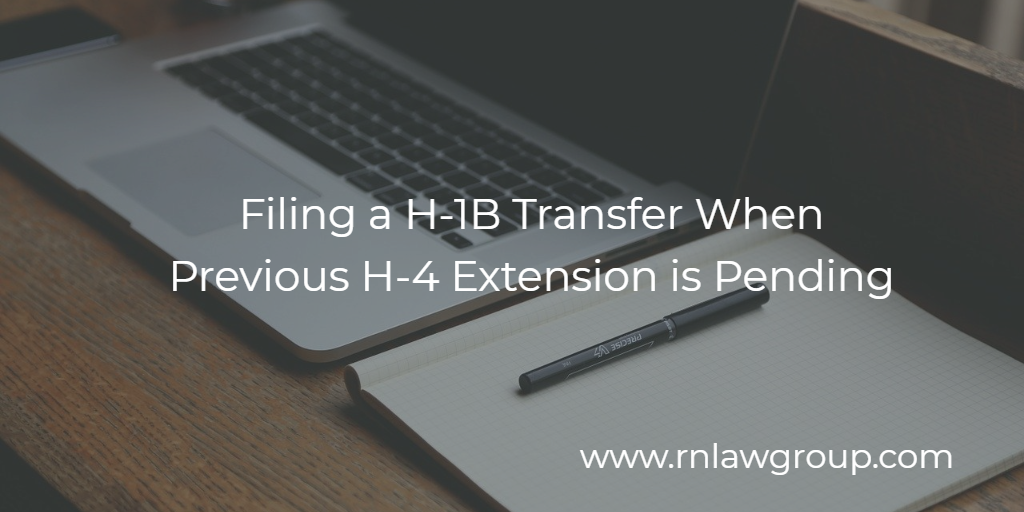
Filing a H-1B Transfer when Previous H-4 Extension is Pending
In a previous article, we discussed the recent trend of individuals having their H-4 and EAD extensions being denied after traveling. We mentioned then that, in the past, that it was not something that was readily done but, for whatever reason, was becoming more frequent. In this article, we want to turn our attention to another issue that, historically, has not been an issue but, given the long processing times of H-4s and H-4 EADS, is now being seen more frequently.
Generally, whenever a company files an H-1B petition, there is the option to file a H-4 alongside of it for any spouse or dependents that the H-1B beneficiary may have. Generally, the H-4 can be extended through USCIS whenever the H-1B Beneficiary is also subject to an extension petition. This is done to generally keep the documents in line with one another and to prevent a mishap that would cause a party to be out of status. If the H-4 status expires, the H-4 holder is expected to leave the country immediately.
So, to prevent this from occurring, it is often common practice to file extensions for the H-1B and the H-4 at the same time. However, where our office is beginning to see issues is when an H-4 applicant has filed for an H-4 extension that remains pending, but the H-1b spouse has filed for a transfer to a new employer. Where does this leave the H-4 holder? Does the transfer nature of the H-1B affect the pending H-4?
Historically speaking, the pending nature of the H-4 extension should not affect the H-1B transfer process or application result. The H-1B spouse can join a new employer if they wish to. However, the only issue with that is if your current H-1B employer withdraws your H-1B after you leave, you run the risk of USCIS outright denying H-4 spouse’s (or child’s) extension.
What we are seeing is that if the H-1B is withdrawn by the previous employer while the H-4 extension is still pending, USCIS sees this as the H-1B not maintaining their status. If this occurs, this also means that, in the views of USCIS, the H-4 holder cannot maintain status either as their status is directly tied to that of the H-1B holder. Due to this relationship, this is an important fact to understand.
While it is not a common occurrence, there have been reported H4 denials when a prior employer revoked the H-1B. However, as previously stated, there generally will not be any issues so long as the previous H-1B petition is not withdrawn. However, the possibility of H-4 status issues can still exist.
In order to help limit any issues that you may run into, it is our suggestion that applicants interfile their H-1B transfer receipt notice in order to request that USCUS update the H-4 application to note the H-1B spouse’s status. Interfiling is a process in which an applicant prepares a letter to USCIS to update USCIS on various parts of their application. While there is no guarantee it will work, interfiling is recommended for two reasons:
- It provides an update to USCIS about the status of the H-1B holder and
- It should prevent USCIS officials from denying the H-4 in the event that the H-1B spouse’s previous employer withdraws the previous H-1B.
With the new H-1B receipt notice interfiled, USCIS’ system should indicate to them that the H-1B holder is maintaining status, and, thus, that the H-4 holder is maintaining status. While it may seem like a small measure to take, we believe that by interfiling the transfer receipt notice, individuals will be able to protect themselves against even the most unlikely of situations. In a worst case scenario, a record of this interfiling can help combat any denials that may come because of the withdrawn H-1B.
If you believe that you may encounter an issue similar to this or if your H-4 extension has been denied due to a previous H-1B being withdrawn, we believe that it is important to speak to a qualified business immigration attorney to assist you. If you have any questions regarding this process or are in need of guidance in how to best comply with USCIS regulations, you can set up a consultation with any of our Reddy Neumann Brown PC attorneys.
By: Steven Brown

